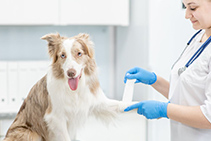
Owning a pet can sometimes come with moments of high anxiety and uncertainty, especially in a medical emergency. Knowing what to do in an emergency can help mitigate some of this stress and anxiety. Listed below are common emergencies and how you can best handle them prior to arriving at a veterinary hospital.
Difficulty Breathing and Choking
Seek immediate help from the vet if your pet exhibits breathing difficulty or choking. This could be characterized by excessive coughing, blue tongue/gums, loud noises when breathing, or increased effort when breathing in or out. There are many causes for difficulty breathing in a pet, ranging from heart disease to foreign objects lodged in their airways. If you note any of these symptoms, please seek immediate veterinary attention. While en route, speak calmly to your pet but do not attempt to stick your hand in their mouth, as this may result in accidental injury.
Seizures
Seek immediate veterinary attention if your pet seizes. Many conditions can mimic a seizure, so it is important to note that a seizure is characterized by a loss of consciousness, violent convulsions, and sometimes urination/defecation. Most seizures only last 2-3 minutes, but medical care is still recommended even if your pet returns to normal after the seizure. A seizure can be indicative of many underlying conditions, ranging from neurologic conditions to diseases of the internal organs. While en route, speak calmly to your pet but do not attempt to stick your hand in their mouth, as this may result in accidental injury.
Anxiety and Pain
Anxiety and pain can be difficult to diagnose in our furry friends. They are unable to verbally tell you when they are in pain; instead, they may exhibit any of the following symptoms:
Aggression
Arched back
Panting
Trembling or shaking
Twitching or tight muscles
Restlessness
Licking excessively
Limping
Refusing to walk or doing it slowly
Refusing to use the stairs or jump
Inability or reluctance to get up or lie down
We recommend taking your pet to a veterinarian if you notice any of the above symptoms at home. At a minimum, we recommend pain medications to help them feel better. However, sometimes diagnostics are indicated to help understand the source of your pet’s pain.
Severe Diarrhea or Vomiting
Most of the time, vomiting and diarrhea are uncomfortable to your pet, but not life-threatening. However, in rare cases, they can lead to severe dehydration and a medical emergency. While on your way to the vet, try to remember what they have eaten or if you saw any chewed-up food scraps laying around. Consider if they may have ingested any poison and call poison control if they have. Medications can be administered to help alleviate the symptoms, even in cases where the cause is unknown.
Severe Bleeding
Bleeding from accidental injuries is common and always warrants a trip to the veterinarian. While most bleeding is self-limiting, sometimes intervention by a veterinarian is required to stop it. All wounds require antibiotic therapy, regardless of the amount of blood loss. Larger wounds may also require stitches to help them heal faster.
Eye Injuries
Eye injuries are a common emergency, as even small injuries warrant immediate medical intervention. Symptoms of an eye injury may include discharge from the eye, excessive blinking, holding the eye closed, pawing at the eye, or the eye no longer residing in its normal location. If you are concerned your pet has an eye injury, please seek veterinary attention.
Broken Bones
If your pet is injured and they are limping or not walking on one of their legs, we recommend taking them to a veterinarian as soon as possible. A veterinarian will recommend radiographs (X-rays) to see if a bone is broken or not. Broken bones often require surgery, as letting them heal on their own can lead to severe issues and unnecessary discomfort in the future.
Heat Stroke
Heat stroke awareness is especially important in Texas, where the summer temperatures can cause your pet to overheat in minutes. Heatstroke is a life-threatening condition and we recommend immediate medical attention. Some of the signs of heatstroke include: • Excessive panting • Bloody vomiting or diarrhea • Seizures, stupor, or staggering • Bright or dark red gums
For more information on pet emergencies, contact True Animal Vet at our office in The Woodlands, Texas.
Dr. Kathryn Salcetti
Director of Urgent Care
True Animal Vet










